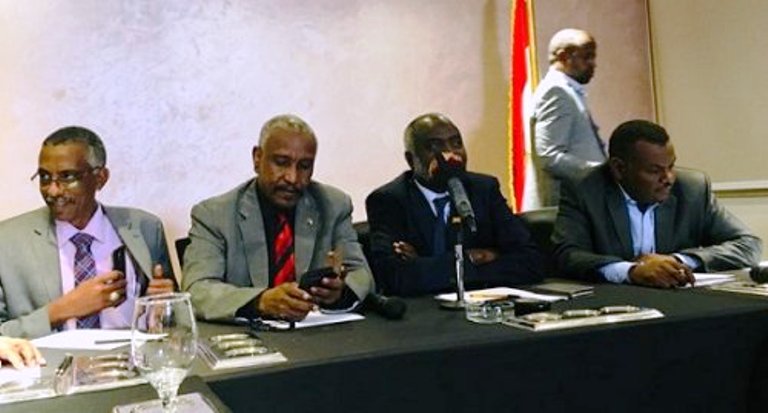Sudan’s FFC fail to bridge caps after RSF demand for cabinet seats

August 12, 2019 (CAIRO/KHARTOUM) – Political and armed groups of the Forces for Freedom and Change (FFC) failed to reach agreement on the Constitutional Declaration as the Sudanese Revolutionary Front (SRF) demand to allocate them some seats in the seats in the transitional executive institutions.
The FFC held a two-day meeting in Cairo at the initiative of the Egyptian government to heal the rift between the political forces and the SRF which rejects the constitutional declaration saying it has ignored the recognition of the primacy of peace agreements over the constitutional declaration.
Sudan Tribune learned that two parties have reached a compromise on Sunday night on Article 69 of the Constitutional Declaration, which relates to the principle of the primacy of peace agreements over the Constitution.
Sources close to the talks told Sudan Tribune that the representatives of the political forces agreed with the SRF that to be effective this compromise should be endorsed by the political forces in Khartoum and then it should be also approved by the military council.
“After agreeing to do so on Sunday evening, the Revolutionary Front returned on Monday with a list of seven demands, the most important of which is their demand for cabinet seats in the transitional government and the Sovereign Council. Also, they demand to postpone the formation of the government for a month to enable the armed groups to participate in it,” he added.
But the delegation of the FFC political groups that they have no mandate to discuss these issues, especially since the principle of quotas is rejected because the transitional government is a technocrat cabinet tasked with peace and implementing the FFC programme.
The Egyptian officials who facilitated the consultations meeting sought to persuade the parties to continue the meetings and suggested to invite the African mediators to bridge the gap between the two sides, but the idea was not seen necessary by the two sides.
The allocation of seats was discussed during Addis Ababa meeting but at the time it was agreed that a ministerial reshuffle will be necessary once a peace deal was struck.
After Addis Ababa meeting and during the two-day meeting in Cairo, the SRF factions have been criticised in the social media for their demand for cabinet seats as people seek to reunite and consolidate ranks to defend the revolution.
Gibril Ibrahim, the leader of the Justice and Equality Movement acknowledged the SRF’s quest to be part of the transitional institutions, wondering “what prevents it,” pointing out that they fought, and confronted the former regime to underline their legitimacy.
“We did not demand this or that job, but what is wrong with that? Personally, I would not be ashamed to say that the Revolutionary Front has the right to participate in the institutions of the transitional period because it carries a project for the transition. This should be seen as a positive sign because it means that the SRF want to end the war”.
Ibrahim al-Amin, National Umma Party representative in the FFC negotiating team told the official news agency that the SRF talked about the quotas in the transitional phase, which is intended to be a stage for the establishment of democracy. He added that the transitional cabinet is a technocrat government without any quotas for any political force and will be tasked with the implementation of the FFC program.
The FFC parties ended the Cairo meetings on Monday night with a press conference announcing their agreement to continue the meetings.
For his part, Yasir Arman, the SPLM-N (Agar) deputy leader said that consultations will be held inside and outside Sudan on the pending issues.
He linked the participation of the SRF leaders to the signing ceremony on 17 August with the feedback of the FFC groups in Khartoum to what was discussed in Cairo, saying: “If the issues are resolved, a delegation from the Front will come to Khartoum.”
Arman revealed that the SRF groups will meet in Cairo within two weeks to discuss the issue of peace.
He further announced an imminent visit to Juba soon followed by another one to Chad after describing the two neighbouring countries as important regional players in the ongoing efforts for just and comprehensive peace in Sudan.
Ibrahim said the SRF meeting in Egypt comes within Cairo’s efforts to play a role in stabilizing the situation in Sudan.
Recently different sources said Cairo has decided to change its policy towards Sudan first through establishing relations with all the political forces and to be more involved in the resolution of political conflicts instead of leaving that for Ethiopia and other regional actors.
Wajdi Saleh, an FFC spokesperson and leading member of the Sudanese Professionals Association said that talks will continue between the parties on the outstanding issues inside and outside the country until a deal is reached to stop the war.
“The Forces for Freedom and Change believe in the democratic transformation and the need for the success of the transitional period,” he added.
(ST)
